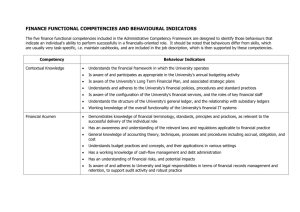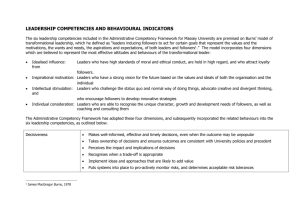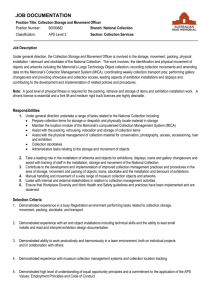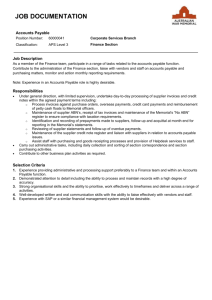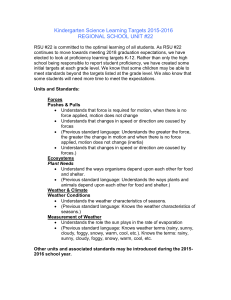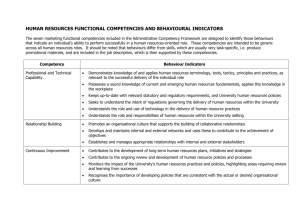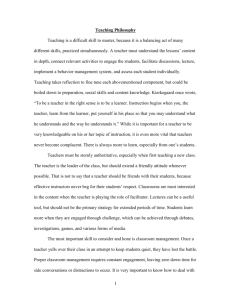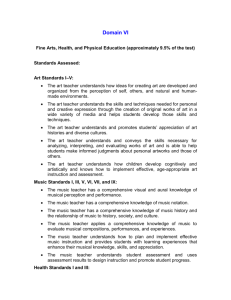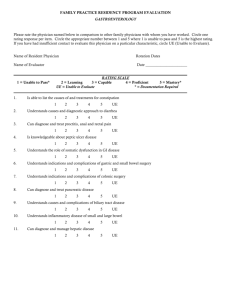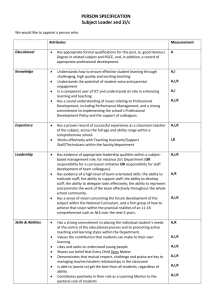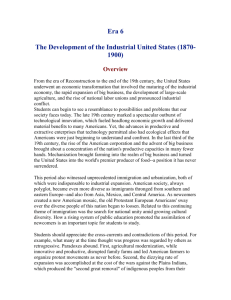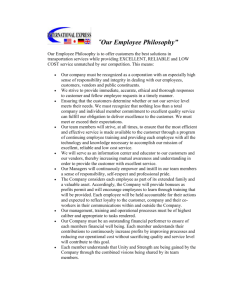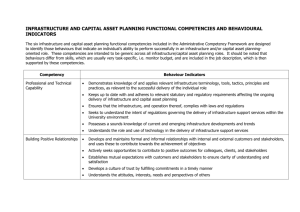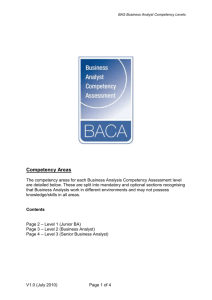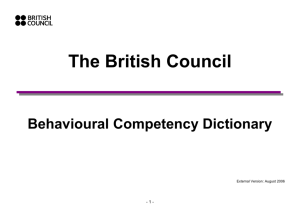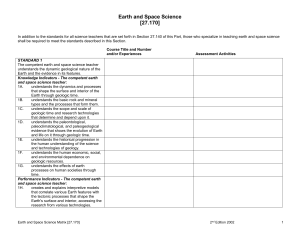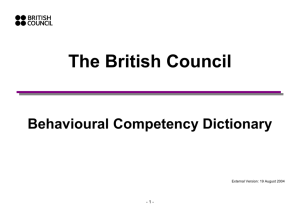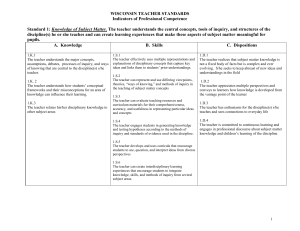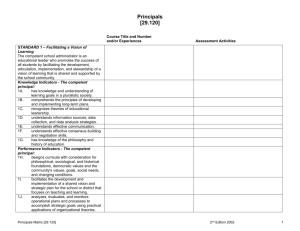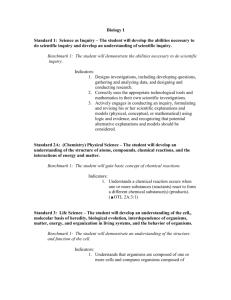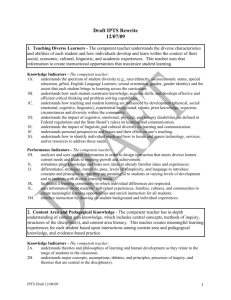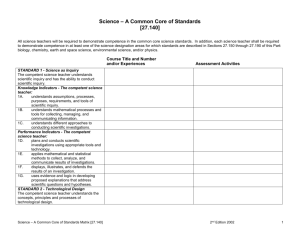Core competencies and behavioural indicators
advertisement
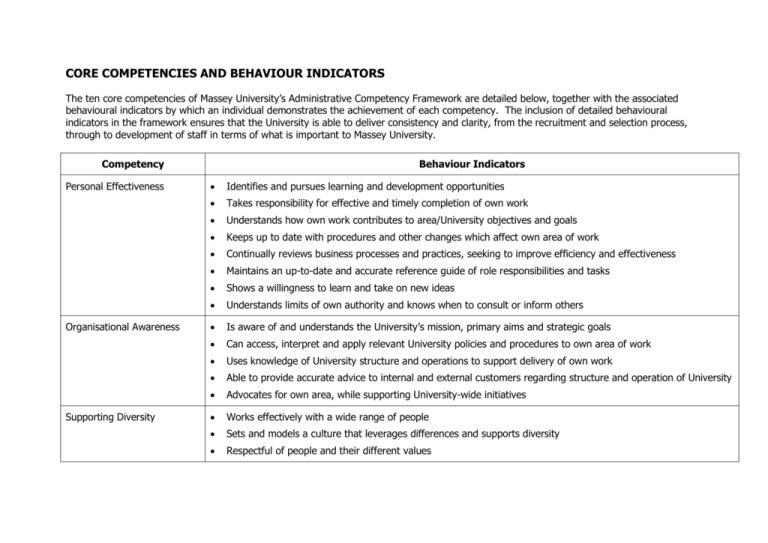
CORE COMPETENCIES AND BEHAVIOUR INDICATORS The ten core competencies of Massey University’s Administrative Competency Framework are detailed below, together with the associated behavioural indicators by which an individual demonstrates the achievement of each competency. The inclusion of detailed behavioural indicators in the framework ensures that the University is able to deliver consistency and clarity, from the recruitment and selection process, through to development of staff in terms of what is important to Massey University. Competency Personal Effectiveness Organisational Awareness Supporting Diversity Behaviour Indicators Identifies and pursues learning and development opportunities Takes responsibility for effective and timely completion of own work Understands how own work contributes to area/University objectives and goals Keeps up to date with procedures and other changes which affect own area of work Continually reviews business processes and practices, seeking to improve efficiency and effectiveness Maintains an up-to-date and accurate reference guide of role responsibilities and tasks Shows a willingness to learn and take on new ideas Understands limits of own authority and knows when to consult or inform others Is aware of and understands the University’s mission, primary aims and strategic goals Can access, interpret and apply relevant University policies and procedures to own area of work Uses knowledge of University structure and operations to support delivery of own work Able to provide accurate advice to internal and external customers regarding structure and operation of University Advocates for own area, while supporting University-wide initiatives Works effectively with a wide range of people Sets and models a culture that leverages differences and supports diversity Respectful of people and their different values Encourages and values diverse points of view and differing opinions Communication Adaptability Job Knowledge Communicates clearly and concisely, in a manner appropriate to the intended audience Listens to understand, seeks input from others and clarification where necessary Uses plain language when communicating, regardless of medium or audience Uses non-discriminatory language Understands and makes use of appropriate communication technologies to promote successful and efficient communication Shares information openly and honestly Is influential and persuasive when necessary Recognises the effect of change on the organisation and the individual Seeks opportunities for innovative and improved approaches to delivering results Contributes constructively to organisational change initiatives Encourages others to participate in and embrace the change process Understands the common barriers to effective implementation of change initiatives and seeks solutions Is comfortable with uncertainty and ambiguity Remains productive through periods of transition Addresses any negative results of change in a realistic and constructive manner Has the functional/technical knowledge and skills to fulfill the assigned role at a high level Acts to keep skills and knowledge current and relevant Uses information systems and supporting technologies to enhance job performance Volunteers to help others to resolve work-related problems and is a credible source of functional/technical or professional information Understands the responsibilities and interdependencies of the role Takes responsibility for producing quality results in a timely manner Building Relationships Integrity Critical Thinking Builds appropriate rapport, maintains open and honest discussions with internal and external customers Uses tact, diplomacy and discretion Is approachable, open, non-defensive and transparent in their dealings with others Perceives the moods and feelings of others; understands attitudes, interests, needs and perspective of others Proactively works to build and maintain internal and external relationships and networks to share knowledge and achieve goals Actively seeks opportunities to contribute to positive outcomes for internal and external customers Exercises effective influencing skills when seeking and building consensus Supports and protects the reputation of the University Supports organisational decisions and initiatives Behaves in a fair, honest, consistent and ethical manner Challenges unacceptable, unethical behaviour Honours work commitments Respects confidentiality Does not blame others for own mistakes, or use position for personal gain Seeks and collates information to support or challenge a given situation Understands and incorporates solutions into effects-based decisions Involves relevant other parties in the decision-making process Where a problem is identified, a potential solution is investigated and proposed Problem-solving is viewed as an improvement opportunity Makes sound, timely and rational decisions which are clearly supported by relevant and accurate information Can voice views that are unpopular and stand up for own beliefs Customer Service Understands the needs of internal and external customers Assists with customer queries accurately and promptly, in a professional and courteous manner Provides customers with sufficient information to allow them to make choices about solutions Strives to develop innovative solutions to improve customer service Monitors customer satisfaction and listens and responds to customer concerns Seeks long-term mutual benefit to the customer and the University
